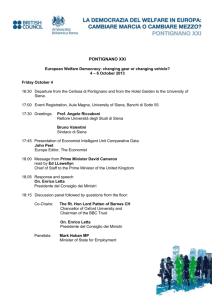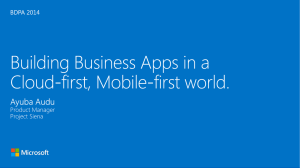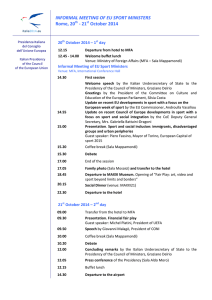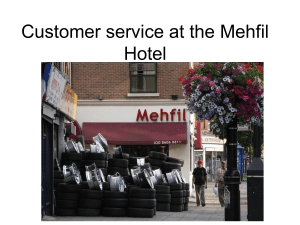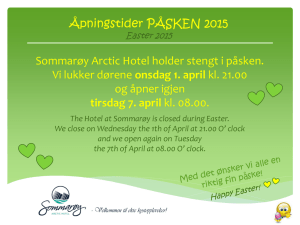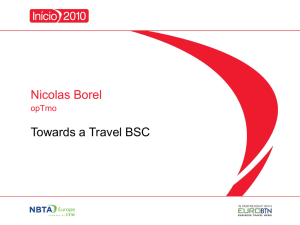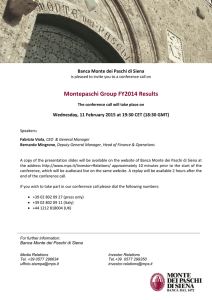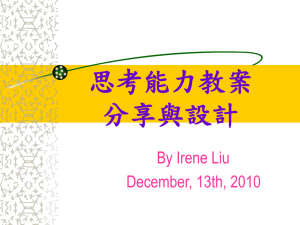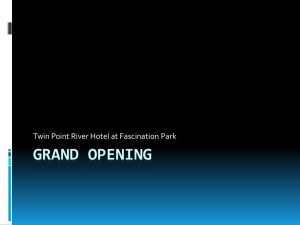CIRCOLARE N. 105 Al.Gen Comparto scuola. SAESE sciopero 26
advertisement
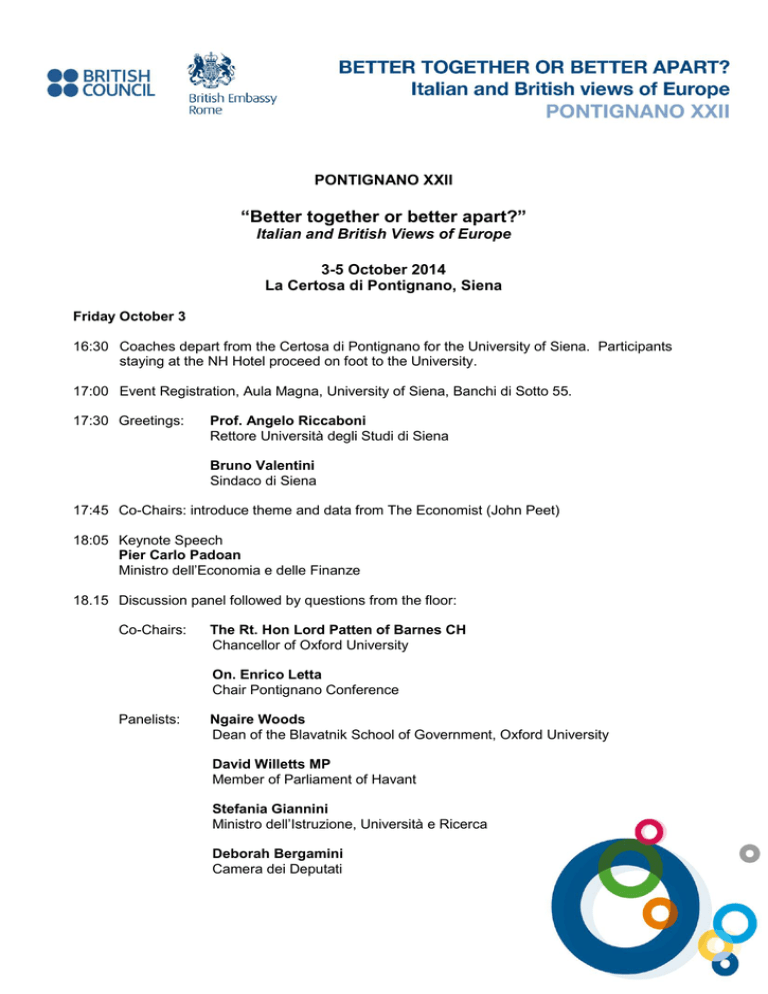
PONTIGNANO XXII “Better together or better apart?” Italian and British Views of Europe 3-5 October 2014 La Certosa di Pontignano, Siena Friday October 3 16:30 Coaches depart from the Certosa di Pontignano for the University of Siena. Participants staying at the NH Hotel proceed on foot to the University. 17:00 Event Registration, Aula Magna, University of Siena, Banchi di Sotto 55. 17:30 Greetings: Prof. Angelo Riccaboni Rettore Università degli Studi di Siena Bruno Valentini Sindaco di Siena 17:45 Co-Chairs: introduce theme and data from The Economist (John Peet) 18:05 Keynote Speech Pier Carlo Padoan Ministro dell’Economia e delle Finanze 18.15 Discussion panel followed by questions from the floor: Co-Chairs: The Rt. Hon Lord Patten of Barnes CH Chancellor of Oxford University On. Enrico Letta Chair Pontignano Conference Panelists: Ngaire Woods Dean of the Blavatnik School of Government, Oxford University David Willetts MP Member of Parliament of Havant Stefania Giannini Ministro dell’Istruzione, Università e Ricerca Deborah Bergamini Camera dei Deputati 19:30 End of Session Departure from the University of Siena to Palazzo Comunale – an approximate 5 minute walk 20:30 Dinner at “Sala delle Lupe”, Palazzo Comunale, il Campo Delegates walk back to Piazza Gramsci to catch the buses for the Certosa. 22.30 First bus leaves for the Certosa Last bus leaves at 23.00 Saturday October 4 08:30 Departure from NH Hotel for the Certosa di Pontignano 09:15 Plenary Session – Sala Mario Bracci, Certosa di Pontignano Co-chairs: Lord Patten and On. Letta Presentation of working group topics by introducers, Q&A, followed by splitting into working groups The Workshops will be introduced by Fabrizio Barca for workshop 1; Bill Emmott for workshop 2; John Peet for workshop 3 and Anand Menon for workshop 4 10.30 Coffee Break 11:00 Workshops 1. Workshop 1 – How can the EU be more competitive and more cohesive? Contracting demographics will multiply the current economic discontent of today’s young and pose challenges for future welfare. Italy’s population falls and ages; whilst Britain’s rises and ages, yet both countries face big political issues caused by hostility to immigration. Some movements call for less immigration, in order to be more socially cohesive, even at the cost of economic growth; whilst others underline how people flows keep the economy afloat. With free movement a core value of the EU, do member states prefer unity or separation? How does the EU help or hinder dealing with these challenges? Should the EU do more or less to make its members competitive and more socially cohesive? Introducer: Moderator: Fabrizio Barca, Dirigente Generale, Ministero dell’Economia e delle Finanze John Hooper, Italy Correspondent, The Economist 2. Workshop 2 – How can the EU win the X-Factor? Far-right or populist parties pose a threat to European integration but the underlying sentiments fuelling these movements stem from the EU’s lack of vision, or inability of those in power to inspire its people. Why has Europe lost its political brand appeal? Did it ever have one? What is the narrative that might inspire our voters and connect it with their aspirations and anxieties? Who articulates a sense today of what it means to be European? Introducer: Moderator: Bill Emmott, Chairman and Co-Founder, The Wake Up Foundation Gavin Hewitt, Europe Editor BBC 3. Workshop 3 - How can the EU make its Governance fit for purpose? Declining electoral turnout points to disappointment at how the EU is run; and betrays voters’ perception that the EU is in the hands of a self-serving elite. How the EU responds to this concern will determine whether these sentiments will result in attempts to reform power at EU level or to repatriate power to national level. Either way the EU needs to become seen as a source of solutions, not problems. Does its present governance widen or narrow the concern about a democratic deficit in our countries? Do our national parliaments need to be more involved in the governance of the EU? Or are there new and emerging systems of political participation and social innovation that will eclipse current institutional arrangements – both nationally and at EU level? Introducer: Moderator: John Peet, Europe Editor, The Economist Beppe Severgnini, Editorialista, “Corriere della Sera” e Opinion Writer “The New York Times” 4. Workshop 4 - How can the EU command respect in the world? The EU regularly debates if it needs, even in our national interests, to create a bigger impact. Are we prepared to undertake a larger role in guaranteeing global security – or should we limit ourselves to a narrower scope of action? Europe’s ability to project hard power is famously limited – but does exist. Our soft power is much vaunted but the respect commanded by enlargement and policy prowess such as environment targets is on the wane. If we want to project ourselves and have some results to be proud of, should we concentrate on our near neighbourhood? Where can we demonstrate leadership that can command the world’s respect, and pride in ourselves as Europeans? Or will the EU’s own democratic processes see ‘disintegration’ trump reform and would this undermine relevance of the EU in the world? Introducer: Moderator: Anand Menon, Professor of European Politics and Foreign Affairs, Kings College London Lucia Annunziata, Editor in Chief, Huffington Post Italy 13.00 Lunch 14:30 Plenary Session – Sala Mario Bracci Reporting back from working groups: Followed by Debate on “How to save the Euro” Speaker: Paola Subacchi Research Director International Economics at Chatham House 16:00 Afternoon session ends and tea break 16:45 Departure from the Certosa to the NH Hotel 19:00 Departure from the NH Hotel to the Certosa di Pontignano 19.30 Aperitivo and dinner at La Certosa 22:00 Buses return to the NH Hotel Sunday October 5 08:30 Departure from the NH Hotel for the Certosa di Pontignano (We advise departing delegates to bring their luggage with them) 09:00 Plenary Session Open Debate between participants on theme to be decided during the previous day. 10:30 Coffee break 11:00 Plenary continues 12:30 Closing of the Conference Lunch
